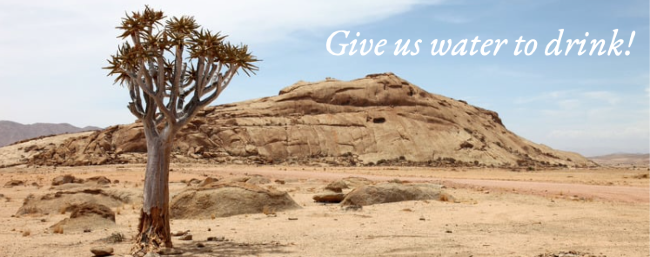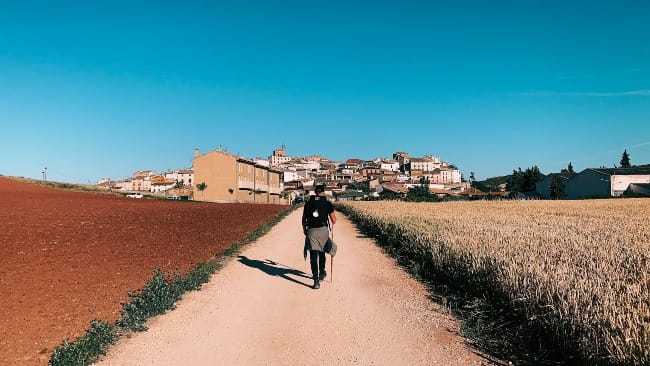Here is the eighth installment of our Exodus series. If you want to take a minute to read Exodus 17:1-7, click HERE. And if you missed the last column in this series, click HERE. Once again, we will walk through the text and highlight aspects that are not typically noticed, and then conclude with a few themes for ecological discipleship. Thoughts and comments are welcome. - James.

Water Issues Continue
After God initiates a rhythm of daily food provision through quail and manna, the Israelites set off again through the wilderness. They travel from place to place "as the LORD commanded" - and in this we see again that their physical and spiritual journeys are linked. As they physically move away from Egypt and through the desert, their reformation as God's people continues. They are headed toward a place - the land of Canaan - that will bring their time of wandering to an end and enable them to live in relative stability and peace. But for them to become the kind of people that can live as God's people in a particular place, the journey they are on is essential.
The journey is also difficult. As they continue through the wilderness, finding water continues to be a problem. As they set up camp at Rephidim with nothing to drink, they again focus their distress and discomfort on Moses: "Give us water to drink." It is clear that Moses continues to occupy a precarious place between the people and God. His response shows his own distress and discomfort with the arrangement - "Why do you quarrel with me? Why do you put the LORD to the test." The people respond with their own question, which we have heard before: "Why did you bring us up out of Egypt to make us and our children and livestock die of thirst."
Very few people enjoy living in transition, and it is hard to think of a longer, harder transition than this 40-year period in Israel's history. I think that is why God continues to be extra patient, and even appears eager to show the young, vulnerable community that God is present and will continue to provide for and protect them. To that end, God instructs Moses to take five action steps:
1. Go out in front of the people.
2. Select some of the elders of Israel.
3. Grab your staff.
4. Go to the rock at Horeb (another name for Sinai).
5. Strike the rock.
These actions steps create a public demonstration that will meet the community's physical and spiritual needs. It will also help distribute Moses' burden by bringing community leaders into the orbit of leadership. Moses' staff is an ongoing symbol of divine presence and authority, and connects their current experience with their liberation from Egypt. In Egypt, Moses' staff struck the Nile and turned its voluminous waters into blood, leaving the Egyptians with nothing to drink. Here in the desert, Moses' staff strikes a barren rock and brings to life-giving water to the Israelites.
It should capture our attention that they have arrived at Sinai, the mountain where Moses received his call from God to go to Egypt and where the people will receive their call to be set apart through obedience to God's law. Divine presence and provision, whether in the form of manna, water, or law, are all connected as part of God's work to renew creation. They all bring order from chaos, life from death, and enable God's will for creation.
With the five action steps come two promises:
1. I will stand there before you by the rock.
2. Water will come out of it for the people to drink.
It is easy to read past God's promise to stand before the rock without taking much notice. But it's an important detail - however this moment was experienced by Moses and the elders, it surely was a powerful experience of divine presence. I can imagine the awe and wonder turning to joy, celebration, and relief as the water began to flow. It is another example from Exodus of God, human beings, and the non-human creation interacting in a creative and cooperative manner. God leads Moses to the rock and helps him open up a hidden water source. God could surely have done this differently, but there is clearly something important about the relational aspect of these moments - Creator and creation are interconnected and interdependent, and called to be in creative relationship.
There is a lot in these seven verses! Here are three themes for continued reflection on our journeys of ecological discipleship.

The Reality of Resistance
Times of transition come with experiences of grief, anxiety, anger, doubt, disbelief, and disorientation, both individually and collectively. We see this clearly in the Israelite experience narrated by Exodus. Their resistance to Moses and to God is understandable and normal.
Ecological discipleship is a way to transition from faith that has been too abstract, propositional, otherworldly, and anthropocentric. Even for those eager to move along this path, it is not always an easy journey. Internal resistance is normal. It is hard to leave behind something that has been a significant source of meaning and stability. In my own journey, I sometimes wonder if I have wandered off the old path too far. When I remember the wonder and joy I have found in this new direction, the feeling passes, but it can be unsettling.
External resistance is normal, too. Ecological discipleship can be seen as a threat to the status quo (because it is). When I preach and teach in churches, people often respond with concern that I am leading people towards some form of paganism or nature worship. I also encounter resistance from the environmentalist crowd for being too religious - Christian faith is often seen as a root cause of our ecological crisis.
It is important to recognize these resistances when they come and to acknowledge that they are rooted in people's experience and represent legitimate concern. It can help to try to get at the root of that concern, whether it be internal or external, and pay attention to how God might be inviting you and/or your community to be courageous and take another step on the journey.

The Connections Between Provision and Presence
The summary question at the end of this story is, "Is the LORD among us or not?" Divine provision is connected to divine presence. How might we realize this connection in our time? One way is to expand our sense of the sacred, recognizing that God is already present within every aspect of creation. "Where can I go from your spirit? Where can flee from your presence?" (Psalm 139:7). With that in mind, we can look for God's presence in the particularities of where we live, the specific watersheds, foodsheds, and neighborhoods we call home.
Additionally, if God's presence is intertwined with the physical provision that makes our lives possible, we must relate to that provision with reverence and respect. Among other things, this calls into question the moral value of industrial forms of provision that do not revere or respect the physical materials they use, or the places they come from. Industrial production tends to reduce animals, plants, ores, and minerals to raw materials to be exploited, rather than divine gifts to be honored, cherished and, sometimes, left alone. It also reduces people to consumers rather than caretakers. Exploring and embracing alternatives, such as community supported agriculture, can help us recover a sense of the sacred in the gift of daily bread.

The Importance of Movement
As we have mentioned, the Israelites' physical and spiritual journey are united. This is why many people throughout history, when faced with some sort of existential crisis (grief, loss, doubt, calling, identity), go on a pilgrimage. This is a literal journey that involves moving one's body through a landscape or seascape, with an intentional openness to the voice of the Spirit. There are dedicated pilgrimage routes, like the Camino de Santiago in Spain, but you can also create a pilgrimmage experience on a walk through your neighborhood. All you need is to walk with an open heart and mind, paying attention to what is going on within and around you. What stirs within you that needs attention? What stirs around you? Where are the places of barrenness? Where might hidden waters be found? As you walk, how might you answer the ancient question, "Is the LORD among us or not?"
With you on the Way,
James
Leave a comment below, or email me directly at james.amadon@circlewood.online.
Like what you are reading? Consider a one-time gift to our parent ministry, Circlewood, or join our supporter community, The Circlewood Stand. Just $10/month makes a huge difference, and makes you part of a growing group of people standing FOR the good of creation and standing WITH Circlewood as we make a difference together. Thanks for considering!